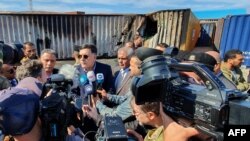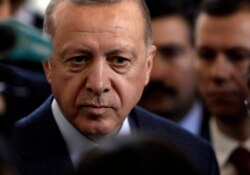Libya's Tripoli-based, U.N.-backed "national unity" government says that it has suspended talks with forces under the command of General Khalifa Haftar, following an attack by Haftar's forces on the port of Tripoli Tuesday, which targeted a ship reportedly carrying weapons from Turkey.
The shelling attack on a cargo ship in Tripoli harbor by Libyan forces under eastern commander General Khalifa Haftar Tuesday appears to have dealt a set-back to U.N.-sponsored talks in Geneva, after members of the Tripoli-based "governing council" said they would no longer meet Haftar's representatives.
Rival Libyan governments disputed the details of the attack on the Lebanese ship, which forces under Haftar claim was carrying weapons from Turkey. Sources in Tripoli dispute the claim and accuse Haftar of killing several civilians in the attack. Haftar's forces deny the allegation.
Haftar met with Russian Defense Minister Serguei Shoigou in Moscow Wednesday to discuss the latest developments in Tripoli, after meeting with the top U.S. diplomat in Libya at Haftar's headquarters in the eastern Libyan town of Rajmah, on Tuesday.
12-point plan to resolve the conflict
The speaker of Libya's House of Representatives, Aquelah Salah, put forth a 12-point plan to resolve the Libyan conflict, Wednesday, according to Arab media. The plan calls for the "disarming of militias in the capital, Tripoli," and authorizes Haftar's forces to carry out the disarming.
The plan is unlikely to be welcomed by the Tripoli-based unity government. The United Nations' Libya envoy, Ghassan Salameh, is calling for a cease-fire between the warring parties "that will be transformed into a permanent agreement."
The European Union says that it would be willing to monitor the cease-fire and arms embargo on the rival parties. The EU offer is unlikely to be accepted by Haftar, who says his forces' goal is to "capture all of Libya," including the capital.
In Ankara, Turkish President Recep Tayyip Erdogan insisted that the "EU has no authority to make any decisions regarding Libya," and went on to say that Turkey would continue to support the Tripoli-based government of Prime Minister Fayez el-Saraj.
He said that [Ankara] will continue to support the legitimate government in Tripoli against Haftar, whom he claims is trying to carry out a coup.
Erdogan also says that Turkey is "gradually strengthening its position in the region," alluding to an agreement over maritime borders with the Tripoli government that is disputed by regional states, including Greece, Egypt and Cyprus.

